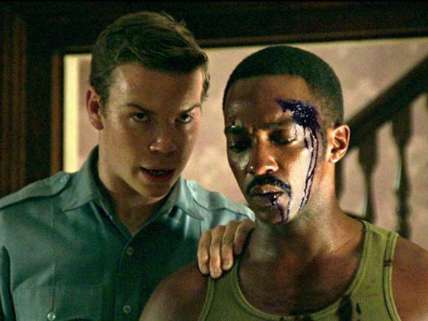Movie Review: Detroit
Kathryn Bigelow's vintage violence.

In her stark yet teeming new movie Detroit, director Kathryn Bigelow accomplishes something rare. Zooming in on a cataclysmic race riot that took place in the Motor City in July of 1967, Bigelow offers for white viewers an intimate sense of what it was like for black citizens to live in a city where they were routinely harassed and beaten down and made to feel like hated interlopers in their own land—and where nothing was ever done about these things. Parallels with present-day spasms of unpunished police criminality are something Bigelow lets us discern for ourselves, which is also rare—there's little condescending moral guidance being dispensed here.
The movie is a bold project by a major director, and it offers much to applaud—mainly the craft with which it's been made. But the picture is also weakened by substantial flaws, more about which in a moment.
Working from a script by Mark Boal, with whom she also collaborated on The Hurt Locker and Zero Dark Thirty, Bigelow starts off at the riot's ground zero: an unlicensed black after-hours club which is being rudely cleared by police. The celebrants inside the club are dragged out like recalcitrant farm animals to be loaded into paddy wagons. A crowd of local black residents gathers, their outrage banked at first – they've seen this sort of thing many times before – but then growing. A bottle is thrown, a shop window is smashed, looters go to work, and before long the state National Guard arrives, 1100 strong.
The violence mounts. We see buildings and cars in flames (sometimes in period photos and footage), and police clubbing black men in the streets. We see a cop named Krauss (Will Poulter) shooting a fleeing rioter in the back, and later, at the police station, being informed that murder charges will be filed against him because the man he shot has died. Krauss, a complete toad, mutters about what he sees as the injustice of this, but then – presumably because able bodies are in short supply amid the night's chaos—he's sent right back out into the fray.
One of the movie's problems is its lack of a central character, which is frustrating, because there are. some fine actors on hand. John Boyega plays a black rent-a-cop named Dismukes, an earnest young man who tries to relate to people on both sides of the racial divide, with varying degrees of success. We do see quite a bit of Dismukes, intermittently, but he's mostly an observer.
A more complex and compelling character is Larry (Algee Smith), a member of a (real-life) vocal group called the Dramatics, whose big breakthrough appearance at the Fox Theatre—following Martha and the Vandellas—is suddenly canceled when word of the rioting outside gets around. There's a beautiful moment after the audience evacuates the theatre when Larry walks out onstage and quietly launches into an a cappella rendition of the song he'd been slated to sing with his group—giving us a sense of how much more is being lost in this riot than just property.
We follow Larry and his buddy Fred (Jacob Lattimore) to the Algiers Motel, where they take shelter for the rest of the night. They make the acquaintance of two vaguely written young white women (are they party girls? prostitutes?) played by Hannah Murray and Kaitlyn Dever, and of a recently returned Vietnam veteran named Greene, played by Anthony Mackie. Murray and Dever get a few moments to inject some personality into the proceedings, but Mackie is underutilized to the point of being wasted.
In any case, the repellent Krauss soon arrives at the head of a detachment of police searching for a sniper they think was shooting from inside the motel—and they're not going to leave until they find him. (In the real Algiers Motel incident, no sniper was ever found.) Krauss and two of his cop pals—a greasy creep named Flynn (Ben O'Toole) and a dim lunk named Demens (Jack Reynor)—line up all the black men and the two white women in a hallway and proceed to harangue and abuse them. This pigheaded quest for the nonexistent gun goes on for a harrowingly long time. Terrible things continue to happen, then lethal things.
Bigelow and her cinematographer, Barry Ackroyd, put us right in the middle of the story's roiling action, both out in the streets and inside the cramped motel rooms and corridors. (The whole movie seems to have been shot hand-held, although it's definitely not a shaky-cam exercise.) But the latter part of the movie is dominated by Poulter's Krauss, who is unappealing in just about every way. There's also a plot strand involving a starter pistol that was unclear to me, and occasional gobbets of over-cooked dialogue. ("In a time of hate, love becomes more important.") There are also a few interludes—like one in a neighborhood church—that would seem ripe for trimming in a movie that runs nearly two and a half hours.
The picture's central defect, however, is the skepticism it stirs in us about the events we're watching. The true story of the Algiers Motel incident is hazed by time and uncertainty, and at the end of the film we're informed that some of what we've seen has been reconstructed. So while some people's real names are used, the three bad-apple cops, who were infamously acquitted of all charges against them in court, and who may still be around, are allowed the safe harbor of pseudonyms.
Still, there are truths in this movie that ring out across the years. When Krauss realizes he'd better release one of his battered detainees, he advises the man not to tell anyone what's been done to him: "I got your name and I know who you are," he says. The man fixes him with a dead-eyed glare and says, "I ain't got your name, and I don't know nothin' about you."


Show Comments (23)